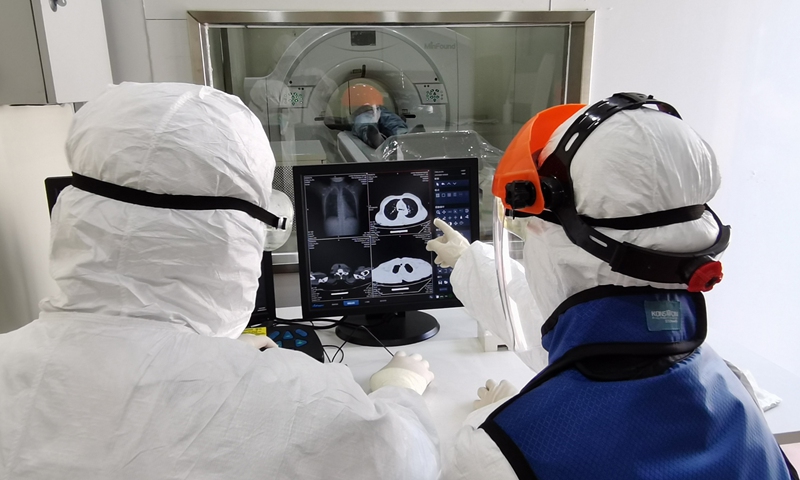Vlogger compares Taiwan healthcare with medical insurance in Chinese mainland, sparking debate
By Ji Yuqiao Source: Global Times Published: 2020/10/20 16:13:40

Medical workers are checking a patient's CT image with a movable CT machine at the "Wuhan Livingroom" makeshift hospital in Wuhan, central China's Hubei Province, Feb. 23, 2020. File photo:Xinhua
A vlogger from the island of Taiwan uploaded a video to compare the healthcare in Taiwan with the medical insurance of the Chinese mainland in accordance with her own experience, pointing out that the former has stood still for a long time, while the latter is developing and constantly improving.
Wang Yunting, who is from Taiwan, chose to live in Shanghai after getting married. As a worker in the hotel and catering business, producing videos and uploading them on several platforms is one of her hobbies and she has more than 1.3 million followers with web name TaimeiPKGIRL on Douyin, TikTok's Chinese version.
Wang did not expect that one post uploaded on the video-sharing platform Bilibili two weeks ago would spark such huge debate among netizens both in the Chinese mainland and Taiwan. In the post, she showed her original bill for hysteromyoma surgery in a triple-A hospital in Shanghai and the fee she finally paid.
The two documents show that although the surgery cost nearly 20,000 yuan ($2,985), she paid about 2,500 yuan in total as she joined the Shanghai medical insurance system in April this year.
The cost saving surprised Wang and she titled her post: It is proved again by my own experience that the medical insurance of the Chinese mainland is better than healthcare of Taiwan.
The comparison got much opposition. But when talking with the Global Times on Friday, Wang still insisted on her view and raised some problems about the healthcare system in Taiwan, such as waste of medical resources.
Healthcare problems in Taiwan
"The healthcare in Taiwan is compulsory. It is like forcing residents to put a part of their money into one pool and no matter who needs to use medical resources, they can take the money out of the pool," Wang said. It seems very fair, but few people are willing to see others using money they put in all the time.
So residents try to buy excess medicines or go to hospital even if there is no need.
Wang said that Taiwan residents like buying many kinds of medicines, which are covered by the healthcare system, and they see doctors even if they just have a cold.
With problems like this, the income of the healthcare system cannot support its expenditure.
"The regional government is considering how to fill the gap for the healthcare fund, but it's difficult. Increasing the insurance premium will not be supported by the people," Wang said.
A Taiwan affairs expert who wished to remain anonymous told the Global Times that the local government puts a lot of money into the healthcare system and there is a waste of resources.
"Taiwan has a relatively mature healthcare system, which is recognized, but it is facing growing financial pressure and it needs tough reform," he said.
The island's healthcare system has had a funding deficit since 2017, according to local media reports.
Chinese mainland healthcare developing
Wang pointed out that compared with the situation in Taiwan, medical insurance in the mainland is developing all the time.
To solve the medical problems of 1.4 billion residents, related policies have been made, such as including more kinds of expensive imported medicine in the medical insurance to ease patients' burden.
Wang was afraid to go to Shanghai public hospitals in 2010 when she just started living in the city as she was worried about large numbers of people and long waiting times.
Now she has experienced a change. She can use her Taiwan residence permit to directly register at machines in the lobbies of Shanghai public hospitals, which takes less than 10 minutes. And the improving medical insurance can deduct medical expenses for her.
Wang also saw other problems like unbalanced distribution of medical resources caused by the huge population in the Chinese mainland, but she said the developing system needs more time.
Posted in: HK/MACAO/TAIWAN,WHAT’S ON